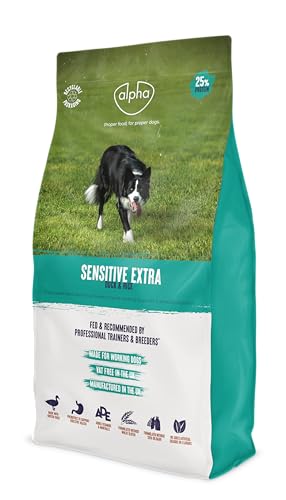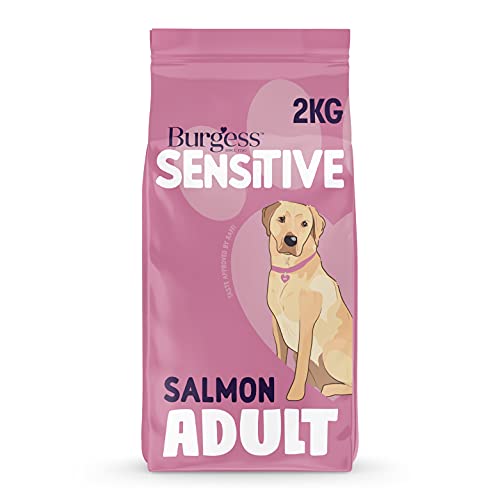Understanding Sensitive Stomachs in Dogs: What You Need to Know
Recognising the Signs of a Sensitive Stomach
If we notice our dog frequently has loose stools, vomits after eating, or shows signs of discomfort such as bloating or gas, it may indicate a sensitivity to their food. Sensitive stomachs can affect dogs of any breed or age, and it’s essential that we pay close attention to these signs. Changes in diet, stress, or even medical conditions can lead to digestive issues. Observing our dog’s behaviour after meals can help us determine if there’s a problem.
Common Causes of Digestive Issues
Several factors can contribute to a sensitive stomach in dogs. Allergies to particular ingredients, food intolerances, or even abrupt changes in diet can upset our dog’s gut. Stress levels are also a significant factor – moving to a new home or changes in routine can lead to digestive unrest. Identifying the root cause of sensitivity helps us better manage our dog’s diet.
The Impact of Diet on Health
A dog’s diet plays a crucial role in their overall health. Feeding our dogs a balanced, easy-to-digest diet not only alleviates symptoms of a sensitive stomach but also promotes better health. Food formulated for sensitive stomachs is designed with specific ingredients that are gentler on the digestive system. By choosing the right food, we can enhance our dog’s vitality and comfort.
Key Ingredients to Look for in Dog Food for Sensitive Stomachs
Focus on High-Quality Proteins
Selecting dog food with high-quality protein sources, such as chicken, turkey, or fish, is vital for dogs with sensitive stomachs. These proteins are typically easier to digest and can provide the essential amino acids our dogs need for their overall health. It’s beneficial to look for foods that feature a single source of protein to minimise potential allergens.
Incorporate Easily Digestible Carbohydrates
Easily digestible carbohydrates, such as sweet potatoes or brown rice, can also be helpful for dogs with a sensitive stomach. These ingredients provide the necessary energy without putting too much strain on the digestive system. We recommend checking for grain-free options if our dog has specific sensitivities.
The Importance of Probiotics and Prebiotics
Probiotics and prebiotics are beneficial for gut health. Probiotics are live good bacteria that aid digestion, whereas prebiotics are fibres that feed these beneficial bacteria. Many dog foods now include these elements, which can support our dog’s digestive health and improve their overall well-being.
How to Transition Your Dog to a New Food: A Step-by-Step Guide
Start Slowly with Mixing
When introducing a new dog food, it’s important to do so gradually. We usually recommend starting by mixing a small amount of the new food with the current food. This helps our dog’s digestive system adjust to the new ingredients without shock.
Increase the New Food Over Time
We typically advise that over the course of seven to ten days, we increase the proportion of the new food while decreasing the old one. For example, during the first couple of days, we could start with 75% old food and 25% new food. Each day we can incrementally raise the amount of new food until our dog is fully transitioned.
Monitor for Reactions
As we transition our dog to new food, it’s essential to monitor their reactions closely. If our dog exhibits signs of digestive upset, we may need to slow down the transition process or consult a veterinarian to ensure the new food is suitable.
Top Recommended Dog Food Brands for Sensitive Stomachs
Brands with Reputation for Quality
Some brands are noted for their focus on quality ingredients and have specific lines designed for dogs with sensitive stomachs. These brands often include easily digestible proteins and wholesome carbohydrates. We might consider brands that use veterinary advice in formulating their recipes, as these foods tend to be well-balanced for dogs experiencing digestive issues.
Specialised Formulas
Many companies offer specialised formulas that target sensitivity in dogs. These formulas usually contain prebiotics, probiotics, and hypoallergenic ingredients tailored to support digestive health. Such formulations can especially benefit dogs prone to gastrointestinal upset, as they provide a gentler option.
Read Customer Reviews
When selecting a dog food brand, reading customer reviews can provide insightful experiences from fellow dog owners. Feedback on how their dogs reacted, along with the overall satisfaction with the product, can guide us in choosing a suitable food for our dog’s sensitive stomach.

































